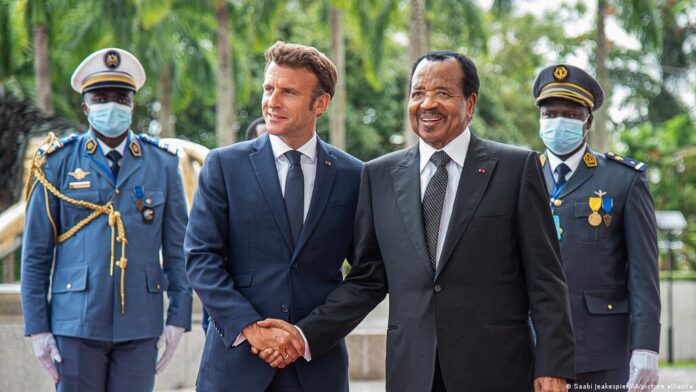Here is Macron’s wish at the end of his visit to Cameroon
Emmanuel Macron, The French President embarked on his first African tour since his re-election last May.
It was on Monday July 25 at 10:40 p.m. local time that he arrived at Yaoundé airport where he was welcomed by Cameroonian Prime Minister Joseph Dion Ngute.
This first visit will be followed by two others which will take him successively to Benin and Guinea-Bissau. The visit of the French President is part of the perspective of reaffirming his “commitment to the process of renewing France’s relationship with the African continent” explained the Elysée.
Emmanuel Macron arrived at the presidential palace on Tuesday morning for an interview with his Cameroonian counterpart Paul Biya (89), who has ruled the country for nearly 40 years.
It was an opportunity for the two presidents to discuss several subjects, in particular the security situation in the North of Cameroon, the conflicts between separatist armed forces in the North-West and South-West and the security forces since more than 5 years.
Thus, during their press conference, the French president admitted that Cameroon “constitutes a strategic partner in Central Africa”, a part of the continent to which he wishes to devote more time during his second term.
Diplomatic relations between France and Cameroon for a few years are no longer the strongest. Indeed, this is the first visit of a French head of state to Cameroon since 2015.
This diplomatic friendship at a standstill between the two countries for years has considerably reduced the influence of France in this case on the economic and commercial levels for the benefit of China, India or Germany.
This visit also presents a strategic challenge because Russia is courting Cameroon, the two countries signed a military partnership agreement last April.
This press conference was especially marked by the declarations of the French president who asked historians to “shed light” on the action of France during the colonization and after the independence of this country, announcing the total opening French archives on painful and tragic moments.
“I wish we could have and launch together a joint work of Cameroonian and French historians,” said Emmanuel Macron.
“I make here the solemn commitment to open our archives in their entirety to this group of historians who will allow us to shed light on this past,” he said. “It is necessary to establish factually” “responsibilities”, added the French president.
“To shed light” on the actions of France during colonization is above all to remember the tragic events which preceded the independence of Cameroon which, let us remember, was obtained in blood because before the independence of the country in 1960, the French authorities bloodily repressed the “maquis” of the UPC (Union des Populations du Cameroun), a nationalist party founded in the late 1940s and engaged in the armed struggle against the colonizer and his Cameroonian allies . Thus, tens of thousands of pro-UPC including their leader were massacred by the French army.
France’s action during colonization was the systematization of torture, the routinization of interrogations, smoking, detention and imprisonment without trial, the massacre of villagers and the persecution of dissident intellectuals, beheading and the display of mutilated bodies in public squares, the occasional massacres and, if necessary, the use of aerial bombardments.
After colonization, it is a country without landmarks in the grip of deep difficulties which is left in the hands of local leaders who have long been fought by the French army. If Cameroon obtained its independence, it is clear that it has always been dependent on France economically and financially.
Here are the real actions of France during colonization which deserve to be revealed in broad daylight because it is not only a question of wanting to reaffirm its commitment to the process of renewing relations, but above all of assuming its responsibilities with regard to vis-à-vis Africa, to restore to Cameroon what France has taken from it for years, and to remind Africans of these crimes of which the continent has been a victim, in order to create collective awareness, in the hope that this will serve as a lesson to current African leaders and future generations.





